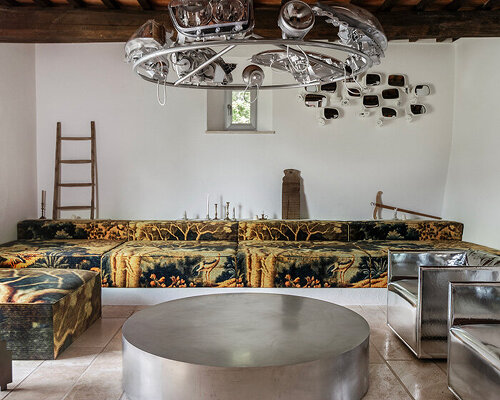crosby studios transforms historic farmhouse in italy
Crosby Studios completes the renovation of a 17th-century farmhouse in Roccalbegna, Tuscany, turning the once-neglected rural structure into a family retreat and the operational center of La Terra di Neena, an emerging olive oil and home goods brand. The project began as a personal search for heritage, expanding into a long-term restoration of both building and landscape, and later into the development of a full design identity.
La Terra di Neena founder Tyler Billinger and Crosby Studios founder Harry Nuriev first encountered the property while traveling with Billinger’s family through Tuscany. The farmhouse, set within a wild olive grove on a 52-hectare site, carried its age visibly with intact timber beams, thick masonry walls, and traces of long-paused agricultural life. Crosby Studios approaches the renovation by preserving this architectural character while inserting elements drawn from its own material vocabulary. Metallic finishes, graphic forms, and sculptural interventions appear throughout the interior. Conventional upper-floor wood planks are replaced with hand-laid river stones, introducing a tactile, irregular surface crafted in place. Gutted headlights are reassembled into chandelier-like pieces, and clusters of rearview mirrors are arranged across the walls in reflective constellations that nod to historic mirror-making traditions.
all images by Matteo Capirola, unless stated otherwise
restoring the landscape and rebuilding the olive groves
Crosby Studios brings utilitarian ‘back-of-house’ materials into a domestic setting. In communal areas, stainless steel anchors the rooms, from a four-meter dining table and benches to a custom island. Harry Nuriev’s creative practice introduces a canopy bed in the primary bedroom constructed from 120 repurposed red T-shirts, each carrying its own anonymous provenance. Textiles throughout the house continue this study of translation, from AI-assisted velvet patterns reinterpreting tapestry motifs to Mylar-like fabrics adopting industrial textures in soft form.
The architectural renovation developed in parallel with a larger ecological effort. Working with landscape architect Anna Andreyeva of Planting Strategies, the team undertook a multi-year restoration of the overgrown olive fields, clearing the land, pruning and rehabilitating ancient trees, stabilizing soil conditions, and reintroducing plantings that support long-term agricultural health. By the time the family hosted their first informal harvest, the farmhouse had become both a gathering place and the center of a revived rural ecosystem, setting the foundation for what would become La Terra di Neena.
Crosby Studios completes the renovation of a 17th-century farmhouse in Roccalbegna, Tuscany
transformism as the conceptual framework
For Nuriev, the project embodies his ongoing manifesto, Transformism. ‘Transformism is the act of turning one thing into another—not by denying its origin, but by illuminating it,’ he notes. ‘The conceptual framework isn’t only about material manipulation — it’s about seeing the potential for new life in an object, whether that be a tattered old sofa or a neglected olive tree.’
Billinger adds that working on the land has shifted their sense of pace: ‘It’s forced us to disconnect from the instant gratification of the digital realm and embrace a slower, more intentional way of living — one that’s deeply rooted in process, tradition, and patience.’
turning the once-neglected rural structure into a family retreat | image by Jenia Filatova
crafting the brand identity of la terra di neena
After four years of architectural and landscape work, Billinger asked Crosby Studios to extend its design approach into the brand itself. The studio developed an identity based on distinct graphic lines, mirrored surfaces, and a sculptural reading of utilitarian forms.
‘Named after my mother, La Terra di Neena is a marriage between new family harvest traditions and a longstanding dialogue with my partner Harry and his creative practice,’ says Billinger. The collection spans olive oil, home goods, and collectible furniture that draw directly from the domestic and agricultural context of the estate: dented tins translated into vases and candles, glycerin soaps cast with olives and branches, mirrored dishware engraved with La Terra di Neena and Crosby Studios motifs, and seating made from unused olive oil cans.
The first iteration of La Terra di Neena’s collection appeared earlier this year at Capsule Plaza during Milan Design Week, where the team presented 200 chromatic laser-engraved canisters, sculptural household objects, and a chair constructed from unused tins from the previous harvest. The brand recently made its US debut at the inaugural edition of Basic.Space NY, unveiling new monumental pieces, including a dining table, stools, and a sculpture resembling oversized dented oil canisters, alongside miniature cooking-pot candles and engraved mirrored dinner plates.
a long-term restoration of both building and landscape | image by Jenia Filatova
set within a wild olive grove on a 52-hectare site | image by Jenia Filatova
image by Jenia Filatova
image by Jenia Filatova
image by Jenia Filatova
image by Jenia Filatova
image by Jenia Filatova
image by Jenia Filatova
project info:
name: La Terra di Neena farmhouse renovation
architect: Crosby Studios | @crosbystudios
location: Roccalbegna, Grosseto, Italy
founder, La Terra di Neena: Tyler Billinger | @tylerbilly
collaborators (landscape): Anna Andreyeva / Planting Strategies
The post crosby studios restores 17th-century tuscan farmhouse with metallic and sculptural details appeared first on designboom | architecture & design magazine.

